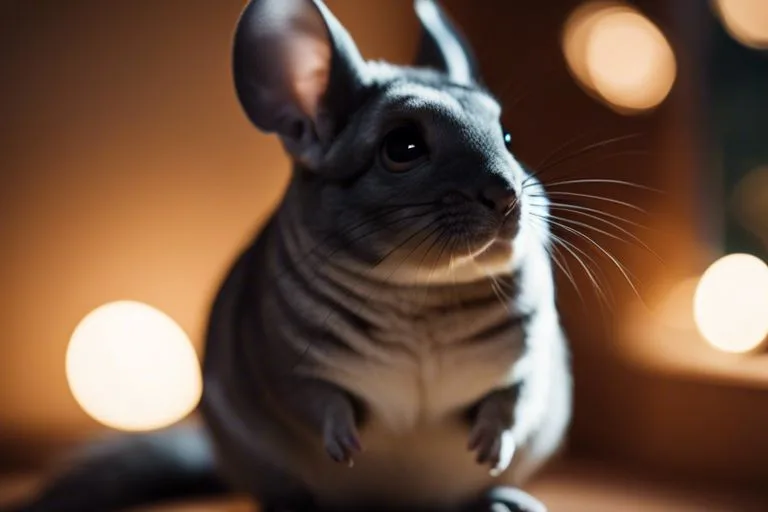It’s a surprising and often concerning behavior—your chinchilla crying at night. While these fluffy, playful creatures are generally quiet, their nocturnal cries can raise questions for pet owners. What do these vocalizations mean? Are they in distress? How can you help them?
In this guide, we’ll explore the reasons behind nighttime crying in chinchillas, from natural instincts to environmental factors and health concerns. By understanding these behaviors, you can take actionable steps to soothe their fears and ensure their comfort.
Key Takeaways
- Why they cry: Chinchillas cry at night due to loneliness, fear, discomfort, boredom, or health issues.
- Natural instincts: These vocalizations stem from their nocturnal nature and their need to communicate or respond to their environment.
- Solutions: Providing companionship, a stimulating environment, and veterinary care when needed can help reduce crying.
Why Do Chinchillas Cry at Night?
Chinchillas cry at night to communicate discomfort, fear, or loneliness. As nocturnal animals, they are most active after sunset, which is when these vocalizations are most noticeable. Understanding why they cry is essential to ensure their well-being.
1. Behavioral Instincts
In the wild, chinchillas are crepuscular creatures, meaning they are most active during dawn and dusk. Their cries at night may serve several purposes, such as:
- Communication: Crying can be a way to interact with other chinchillas, signal distress, or establish territory.
- Alertness: Darkness triggers their natural instincts to remain vigilant for predators.
Even in captivity, these instincts persist, causing them to cry or vocalize, especially in response to their environment.
Common Causes of Night time Crying
2. Fear and Anxiety
Chinchillas are sensitive animals, and their cries may indicate fear or stress caused by:
- Loud noises (e.g., music, construction, or other pets).
- Sudden movements or unfamiliar changes in their environment.
- Proximity to potential predators.
Solution:
- Place their cage in a quiet, low-traffic area of your home.
- Avoid sudden loud noises or abrupt changes to their environment.
3. Loneliness and Isolation
Chinchillas are highly social animals that naturally live in colonies. When kept alone, they may cry out due to loneliness or a lack of social interaction.
Solution:
- Consider getting a second chinchilla for companionship.
- Spend time interacting with your chinchilla daily through play or gentle handling.
4. Boredom and Lack of Stimulation
Without adequate mental and physical enrichment, chinchillas can become restless and vocalize their dissatisfaction.
Solution:
- Provide chew toys, exercise wheels, and climbing structures.
- Rotate toys regularly to keep their environment stimulating.
Health-Related Causes
5. Pain or Discomfort
A crying chinchilla might be trying to express physical discomfort. Common health issues include:
- Dental Problems: Overgrown teeth can cause pain, as chinchillas’ teeth grow continuously.
- Digestive Issues: Improper diet or unsuitable treats can lead to gastrointestinal discomfort.
- Infections or Parasites: Respiratory infections or parasites can cause distress.
Warning Signs:
- Loss of appetite.
- Labored breathing or wheezing.
- Unusual posture or decreased activity.
Solution:
If you notice these symptoms, seek veterinary assistance immediately. Regular check-ups and a proper diet (high-quality hay and chinchilla-specific pellets) are essential to their health.
Environmental Factors That Trigger Crying
6. Uncomfortable Living Conditions
Environmental stressors like temperature changes, high humidity, or inadequate living space can cause chinchillas to vocalize.
| Factor | Impact on Chinchilla |
|---|---|
| Temperature | Sudden changes or extremes can cause stress and health problems. |
| Humidity | High humidity can lead to respiratory issues and discomfort. |
| Cramped Space | Small cages can cause boredom, frustration, and behavioral issues. |
Solution:
- Maintain a stable temperature between 60–70°F (15–21°C) and keep humidity levels low.
- Provide a spacious cage with multiple levels for climbing and exploring.
7. Darkness and Quietness
The natural stillness of the night may amplify your chinchilla’s cries. They may also feel more vulnerable or alert in the dark.
Solution:
- Use a dim nightlight to reduce their sense of isolation.
- Add soft background noise (e.g., white noise) to mask sudden sounds that might startle them.
How to Comfort a Crying Chinchilla
Step 1: Check for Health Issues
Before anything else, rule out pain or illness as the cause of their crying. If you notice unusual behaviors or physical symptoms, consult a veterinarian.
Step 2: Improve Their Environment
- Create a cozy and quiet area for their cage, away from noise and activity.
- Add plenty of bedding to provide warmth and comfort.
Step 3: Engage Them Socially
- Spend time with your chinchilla every evening, as they are most active during these hours.
- Introduce another chinchilla to reduce loneliness, but monitor for territorial behavior during introductions.
Step 4: Stimulate Their Minds
- Rotate new toys and accessories regularly to keep them engaged.
- Offer safe chew items to satisfy their natural chewing instincts.
FAQ: Addressing Common Concerns
Q1: Why do chinchillas cry at night?
Chinchillas cry at night to express fear, loneliness, or discomfort. These vocalizations are instinctual and often tied to their nocturnal activity.
Q2: Is it normal for chinchillas to be vocal at night?
Yes, it is normal. As nocturnal animals, chinchillas are naturally more active and vocal during the night.
Q3: How can I help my chinchilla stop crying?
Provide a calm, quiet environment.
Engage with them socially and provide toys for stimulation.
Consult a vet if you suspect health issues.
Final Words
Chinchillas crying at night may seem mysterious, but it is often their way of expressing natural instincts, needs, or discomfort. By understanding the causes whether they stem from loneliness, environmental factors, or health concerns you can take meaningful steps to comfort and care for your pet. With proper attention, stimulation, and companionship, your chinchilla can enjoy a happy, peaceful life.
